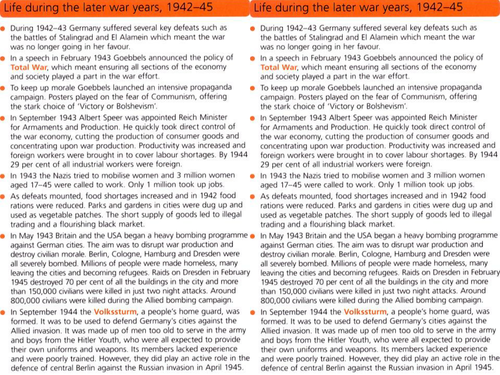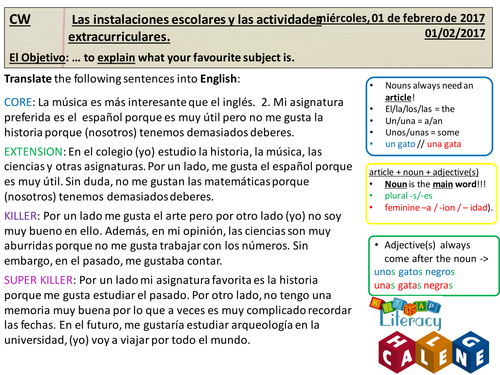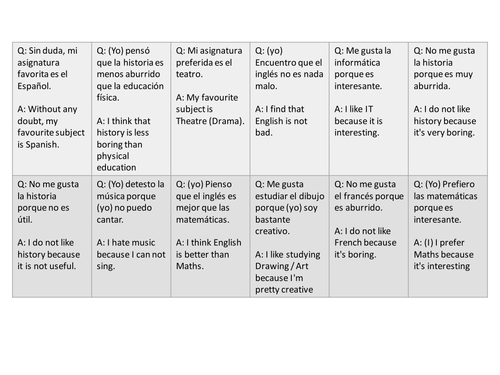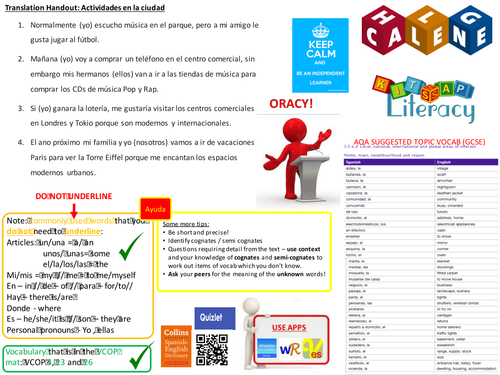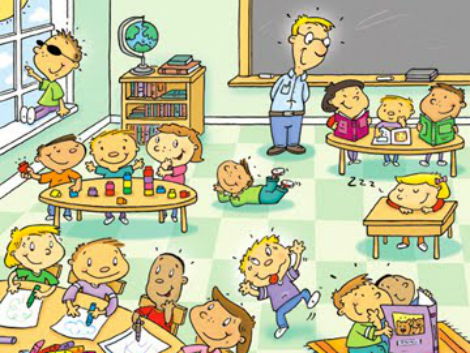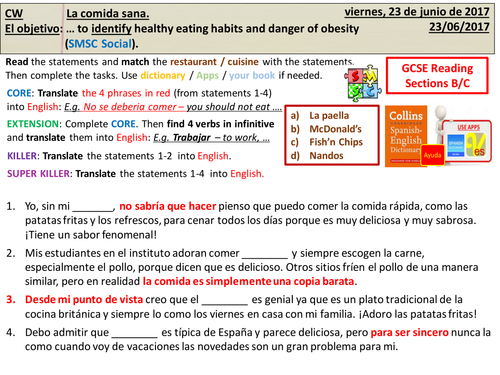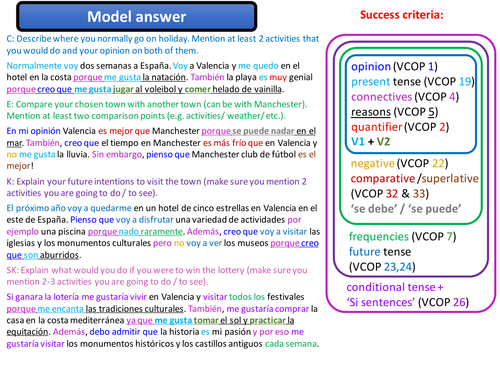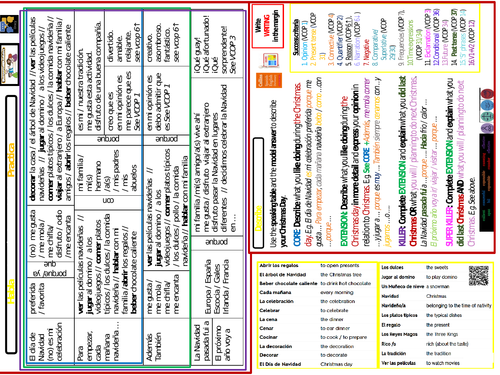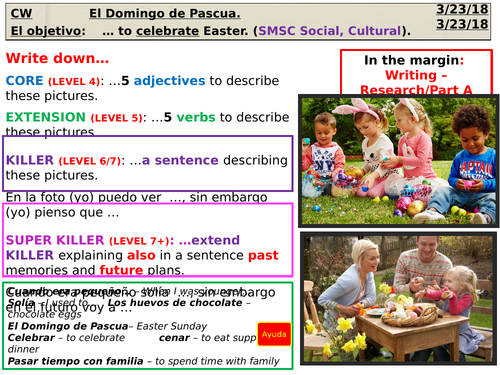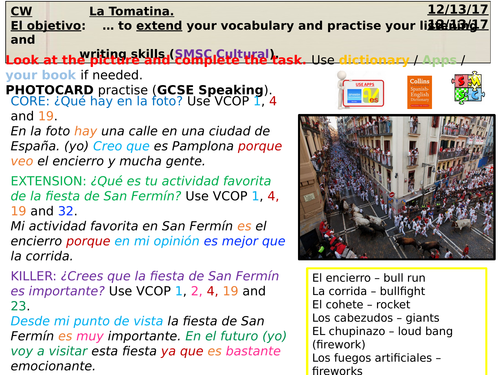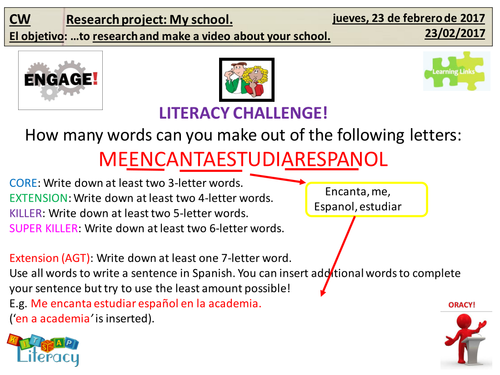
121Uploads
36k+Views
5k+Downloads
All resources

Nazi Treatment of Jews during WWII (Later years)
These lessons are about Nazi Treatment of Jews during WWII (Later years). The slides include a set of my standard activities, such as settler, starter (exam question with success criteria, model answer, explanation on how to assess the answer, peer/self assessment, SPAG control slides), information research task (see appropriate handout) and some fun activities for revision of information.
You can also find this lesson in a pack of lessons about the treatment of Jews through the whole WWII.

Opinions and reasons - Spanish- AQA (new spec) GCSE Listening (Section A) practice
This is a lesson on opinions and reasons in relation to school facilities and extra-curricular activities for a GCSE Spanish class. The lesson includes a differentiated starter activity to practice translation skills followed by a mini-test on school subjects vocabulary. The new practice phonics when pronouncing new words (see new vocabulary attached - quizlet) followed by the quizlet activity itself. Students are to choose what quizlet task they want to do based on their level. Then I have included a set of slides to introduce the best way (in my opinion) to approach a listening task. I have wrote the text of the listening myself, based on the New Aqa spec assessment specimen (I read it aloud but you may as well record it). There is also a Rally Coach activity ti consolidate the knowledge of the new vocabulary after they looked at the task. I have then provided them with a hint on how to find an answer by giving them a text of what was said. Finally, they note the answers and write a self/peer assessment. Please note that the penultimate slide is the handout in case you want to make it easier for the students. Enjoy!

Opinions on studies - Spanish- AQA (new spec) GCSE Reading (Section A) practice
This is a lesson on opinions ad subjects for a GCSE Spanish class. The lesson includes a literacy (scramble style) starter, a Mini-test on present tense verbs conjugation ( I often give these ones), a quizlet on the words that would be used in the reading task, and a reading task itself. I am trying to teach them how to approach these tasks in the most effective way so they underline the words they know and find out the ones they do not. I wrote the text myself on the basis of the one from the specimen materials for it to have a similar structure to the one they will see in the exam. Finally they self-assess their work (and learn new words!). I also attach a quiz quiz trade that I have prepared for the end of the lesson to revise the previously learned grammar and vocabulary.

2 versions of AQA GCSE (new from 2016) : Activities in town - Exam practice (Reading, Section C)
This is the lesson for my GSCE Spanish class about activities in town. It includes a range of activities to satisfy the school policies, such as Independent Learning, Kagan, differentiation and engagement. I have included a short test to check vocabulary and a quizlet to learn some new words that they would use when completing the Reading activity (AQA new specification Reading Section C). I was trying to teach them how to approach text reading and translation. I also include a handout that I have prepared as an additional help. Please note that VCOP mat refers to reasons, opinions and the tenses.
I attach two versions of the same lesson as one I used with older pupils and another one was amended for the observation (I got 1c/2a feedback!)

Town research project for KS3/KS4 Spanish - Mi ciudad favorita
This is a research project lesson (or two lessons really) that I created for my year 8 Spanish students. It can also be used for year 9 as the model answer has quite a list of grammar / some more can be added. The idea is to promote independent learning via research. There are two choices: a documentary about your favourite town in England (in my case it is Manchester) or an interview with a football player about his town in Spain ( I chose Madrid). Students decide on the task, the roles and start researching relevant information using their iPads (one of the students needs to summarise the information that others found). They then have to prepare a script in Spanish and to make a video using iMovie or any other video application. If there is little time I would suggest them to present it and I would film it. The whole process takes about 2 lessons and is perfect for the end of the topic as you can incorporate all of the structures / vocabulary learned during the term!

A typical school day - Spanish- AQA (new spec) GCSE Reading (Section B)
This is a lesson is about a typical school day for a GCSE Spanish class. The lesson includes a literacy (scramble style) starter, a tongue twister activity (to practise pronunciation of the 'go' sound), a pronunciation activity and a quizlet on the words that would be used in the reading task, a rally couach mini-plenary (it goes after I first show them the text so they realise they would really need to remember the words) and a reading task itself. I am trying to teach them how to approach these tasks in the most effective way so they underline the words they know and find out the ones they do not. I wrote the text myself on the basis of the one from the specimen materials for it to have a similar structure to the one they will see in the exam. I have also included a slide on how to use VES application to find and to correctly translate a verb which is not written in infinitive and a mini-plenary for them to practise using the same. You can introduce some competition in here if you wish. Finally they self-assess their work and compete to translate / provide a definition of the words in the plenary task that they have learned in previous lessons.
Bundle

Studies - AQA GCSE Spanish - 4 lessons + speaking framework and model answer+ research project
This is a bundle of 4 lessons and a research project in relation to the topic of Studies in the AQA GCSE specification (originally for the early GCSE year but can also be used for revision for years 10 &11). These lessons are prepared for the tropics of opinions and reasons on the schools subjects, typical school day and school rules. The bundle is finalised with the research project which includes the structures and grammar from the whole topic, that can be changed / adapted / differentiated further to your needs. I have also included the speaking framework for the Part 3 of the Higher Tier exam that can also be used in writing practice.
Bundle

Mi ciudad - Activities in town, photo card worksheet and project AQA GCSE
This is a brief bundle for the young GCSE Spanish class or for the revision of the older students. I included 2 versions of my observation lesson (practice of Section C reading exam task), a photo card help worksheet (can also be used for the topic writing practice) and a research project about a favourite town with the model answer that practically summarises the topic vocabulary and can also be used for the revision tasks (can be amended if needed).

Healthy Schools week PSHE - La comida sana - KS4 Spanish AQA new spec
This is the lesson I have prepared for the healthy schools week for my year 9 and 10 Spanish GCSE classes. It consists of starter, tongue twister to practice phonics, a mini-test on adjectival agreement and articles (I love those surprised faces when they see the word 'TEST'), quizlet task to learn / revise vocabulary on food, quizlet live to consolidate the same, AQA Listening Section A task with explanation on tips and strategies (my usual walk-through, I usually read it out myself) with self-assessment. It is followed by the Reading Section A task on obesity case in Mexico (from EL PAIS online journal) with the same walk-through and Oracy task (slide 20). I would usually read the text and pause for the students to say the word I was about to read so they actually practice phonics and follow the text. For the end I asked them to prepare a poster for the year 6 students that are coming to school for few days to look around. There are also some mini-plenaries here and there. The origin of the Listening task is VIVA AQA Higher GCSE book. Buena suerte!

Research project (Motivational triggers) for KS3 Spanish - Buen Viaje (Holidays) (AQA new spec)
This is a research project lesson (or two lessons really) that I created for my year 7 Spanish students. The writing example can be easily adapted if more structures are to be added. The idea is to promote independent learning via research. Students have to research information about the place that they would like to visit (any place in world really but I encouraged to visit Spain). Students decide on the task and start researching relevant information about the chosen location using their iPads/ Chromebooks. At the same time they create a poster or a travel brochure with pop-up images (!!!) about the chosen location. During the second lesson they distribute the writing task bullet points in-between the members of the group and complete a piece of writing as per success criteria and model answer. In the end they stick their written notes (or attach them) to their poster /travel brochure. The whole process takes about 2 lessons and is perfect for the end of the topic as you can incorporate all of the structures / vocabulary learned during the term! Note: the writing example is oriented on the revision of tenses studied this year, holidays, weather and location vocabulary. Please let me know if you have any other ideas on how this project can be implemented. If you still have some time left you can enjoy few games I have inserted to simply have fun during the (possibly) last lesson of the year.

Your Christmas Day - KS3/KS4 Spanish (AQA)- Observation 1c/2a
This is a Christmas lesson that I created for my higher KS3/KS4 Spanish students and mainly for my lesson observation. The idea is to have some fun and to do some writing as well!
The lesson starts with a friendly - easy starter and pronunciation slide to learn how to pronounce some Christmas / winter related words. Then we move on to a quizlet task to learn / revise some X-mas vocabulary and Rally Coach activity to check whether we remember the words. I have then included a conjugation activity with the Christmas verbs (you need some dices!) followed by a competitive translation activity (make sire you have similar ability students working together). The students then use a trap door structure (table) to speak about their Christmas day and then I tell them about my Christmas day in a similar manner as suggested by previous activity. I first use pictures only and then show them the model answer and the grammar success criteria. After they write down their responses we move on to playing quizlet live and Hangman. Enjoy!

El Domingo de Pascua (SMSC - Cultural) Spanish (AQA) KS3/ KS4 lesson
This is an Easter lesson that I created for my higher KS3/KS4 Spanish students. The idea is to have some fun and to do some writing as well!
The lesson starts with a friendly - easy starter, lesson plan and pronunciation slide to learn how to pronounce some Easter related words. Then we move on to a quizlet task to learn / revise some Easter vocabulary and Rally Coach activity to check whether we remember the words (translation practice). I have then included a conjugation activity with some verbs (you need some dices!) followed by a competitive translation activity (make sure you have similar ability students working together). The students then use a trap door structure (table) to speak about their Easter day and then I tell them about my Easter day in a similar manner as suggested by previous activity. I first use pictures only and then show them the model answer and the grammar success criteria. After they write down their responses we move on to playing quizlet live and Hangman. Enjoy!
Bundle

Festivals and Celebrations bundle Cultural / SMSC
This bundle includes a collection of eight lessons created for few international celebrations such as Christmas and Easter as well as some traditional Spanish Festivals (e.g. Las Fallas, San Fermin, La Tomatina). I have tried to use some videos and games to make it more engaging whilst still providing students with some grammar / AQA GCSE exam practice. I also included the cultural starters I used as well as a template of my drill for teaching students how to answer AQA GCSE Reading parts A and B based on the text about Aste Nagusia, a Basque festival.
Bundle

Christmas bundle- Spanish/French - KS3/KS4 AQA
This a small bundle of two (possibly three) lessons for KS3/KS4 Spanish students. I also attach its analogue in French. Part of it is a research project than can take 1-2 lessons and another one is a lesson to describe your Christmas day in Spanish!

Spanish Festivals: La Tomatina - Spanish KS4 AQA Writing 3
This is the lesson that I have prepared for my y9/y10 in relation to the topic of Spanish culture (Festivals & Celebrations). The lesson starts with the starter about San Fermin Celebration (photo card style) (it was previous lesson title and I always try to link things together) and following review of lesson outcomes we move onto to trying to sing along with Enrique Iglesias (click on the 3d man for the youtube link or search for a YouTube video with lyrics). Students will then recap on SER conjugation in present tense and learn new / revise already known vocabulary on the topic of La Tomatina celebration using Quizlet and Quizlet live online tools. I have then included a video (see link) of Rosa from SpanishPod101 (see their channel in youtube) describing the celebration of La Tomatina. Even though the video is in Spanish and Rosa speaks really quickly, there are subtitles in English so that all students have a chance to listen to a native speaker and at the same time understand what the video is about (note: I personally find the Spanishpod101 videos amazing as they address quite a few cultural / grammar / pronunciation and other aspects so I would recommend letting your students know that a lot of resources are available for free. Consequently, students answer quiz questions about the video and move on to the grammar activity. They revise present tense and then analyse how to form 'Impersonal SE' structures. Then they do a quick test to check understanding and move on to a Writing Section 3 activity (translation from English into Spanish). They self-assess it and play Pictionary. Please note that there is also a handout to make the tasks easier and faster to access. Enjoy!
Bundle

KS3 RE: Christianity and Islam bundle
A set of 9 lessons for KS3 RE groups aiming to introduce students to some specific features of Christianity and Islam and to develop skills for answering the questions using PEE structure. Lessons include Kagan activities, PEE slides with sentence starters and peer/self-assessment materials. I have also included the assessment that I did on Christianity that term.

AQA GCSE (teaching from 2016) : Town and local area - Speaking - Photo card Model answer 1
This is the handout for my GCSE Spanish class to prepare for Speaking assessment. It includes brief success criteria and where to find it, what to include and a template for an answer. I have included both the PowerPoint slide and the handout.

Free time activities - Spanish - AQA GCSE new spec Part 3 HT - Conversation - Speaking frame
This is the speaking framework that I wrote for the early GCSE classes. The framework was originally designed for them to write an essay that they might use for the speaking test or keep it in file to revise prior to the exam. I have also used it as a writing model answer.
I have left references to the VCOP mat in case someone wants to put their numbers in, alternatively, just delete them as I left the names of the structures.

School Rules - Spanish - AQA new spec -Exam practice (Reading, Section C)
This is a 2b lesson on school rules for a GCSE Spanish class that I happened to have an observation with (unexpectedly!). The lesson includes a literacy starter (students have to find and amend the mistake in the sentence), a mini-plenary on grammar in relation to the starter, a tongue twister slide to practise 'i' sound, a mini-test on present tense verbs conjugation ( I often give these ones), a mini-test on articles, a pronunciation slide and a quizlet on the words that would be used in the reading task, and a reading task itself. I am trying to teach them how to approach these tasks in the most effective way so they underline the words they know and find out the ones they do not. I wrote the text myself on the basis of the one from the specimen materials for it to have a similar structure to the one they will see in the exam. Finally they self-assess their work (and learn new words!). This lesson includes the explanation on how to use 'Spanish Dict Box' application to finds out the meaning of unknown words.

Research project for KS3/KS4 Spanish - My school
This is a research project lesson (or two lessons really) that I created for my year 9 Spanish students. It can also be used for older students as the model answer has quite a list of grammar / some more can be added. The idea is to promote independent learning via research. There are two choices: a documentary about your school or an interview with between a student from your school and a school in Spain. Students decide on the task, the roles and start researching relevant information using their iPads (one of the students needs to summarise the information that others found). They then have to prepare a script in Spanish and to make a video using iMovie or any other video application. If there is little time I would suggest them to present it and I would film it. The whole process takes about 2 lessons and is perfect for the end of the topic as you can incorporate all of the structures / vocabulary learned during the term!

